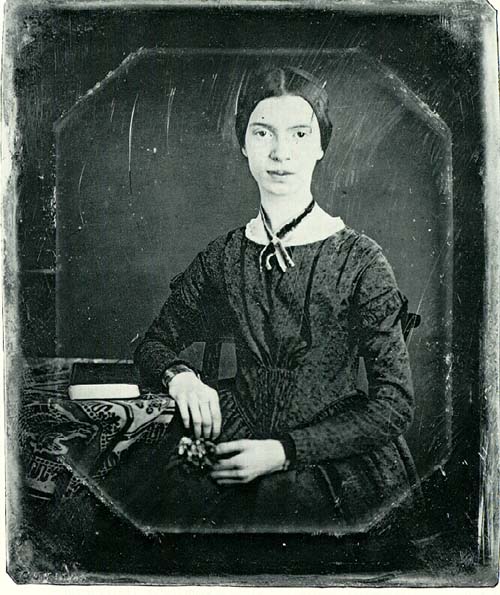
I'm a proponent of workshops. But I'm not sure that they're doing Emily Dickinson good in this critique.
Still, I guess Miss Emily wasn't completely hopeless:
"I'd like to see you bring this through the workshop again."
Always end with encouragement, that's it.
But still, in another critique, she should pay attention about correct fonts-- handwritten just doesn't do it. And,
"Almost all of your writing is about death. Could you lighten up? ...your self-esteem needs a boost. Have you thought about therapy, Em?"

3 comments:
I know a lot of people champion these pieces, even use them in teaching, to expose students to the idea that all comments in workshops are not necessarily true or useful. Furthermore, many non-academic poets use these to prove exactly what is wrong with academia, the MFA, writer's workshops in general, etc. And, on one level, they do prove that.
However, what bothers me about these is that they completely ignore context and history. For her time, Emily Dickinson was eccentric, possibly, but still within the realms of normal. However, now she would be labeled as possibly agoraphobic, certainly depressed or suffering from some sort of anxiety disorder, etc. We can make the argument that this is because the medical profession has taken things to an extreme, which certainly has merit, but can also argue that in over 100 years, society and their expectations have changed. This context NEEDS to be taken into account when reading Dickinson's poems.
Furthermore, in terms of craft, I think many of Dickinson's poems (as well as many of the Romantics, the Metaphysical poets, Shakespeare, etc.) would suffer at the hands of a modern workshop/critique/etc. because they are so dated, both in terms of language choice as well as acceptable poetic craft. All of these poets are pre-Imagist, and like it or not, the mentality of imagery over abstraction is pretty much entrenched in the modern poetic sensibility. Many of the lines from the 19th century read as dated, abstract, distanced, etc for this very reason. However, given the historical context and understanding, it's clear that poets and poetry students can learns to understand them.
A great example of this which I use in class is Donne's "Batter My Heart, Three-Person God" in which the speaker is literally asking the Divine to break and rape him. Students are forced to dig through their dictionaries and actually map out the poem to understand that this what is being written, and even then still miss some of the nuances of the piece and a total understanding due to the historical distance between them and Donne. Some actually feel as though the poem is ANTI-religious or ANTI-Christian, again because of that historical and language distance. Dickinson, with her use of nonconventional language choices and writing styles, certainly proves to be as problematic for modern readers in general, and I think it is these historical distances that are revealed in the two Workshop scenarios as much as it is problems with workshops or modern poetics.
Because I could not stop for hacks...
Visit Emily's home and town - imagine the simplicity of it in the past, and relish in all the delights it holds. Why leave?
We tend to complicate her richness through circumstanes we don not truly know.
Post a Comment